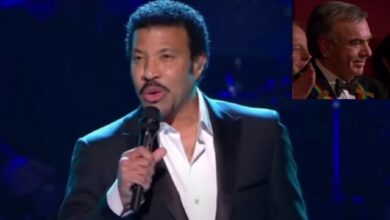Heartfelt Kennedy Center Tribute: Lionel Richie Performs “I Am…I Said” for Neil Diamond
Lionel Richie’s stirring performance of “I Am…I Said” at the 2011 Kennedy Center Honors marked a significant highlight in the event’s storied history, showcasing not only Richie’s remarkable musical talent but also celebrating the extraordinary legacy of Neil Diamond. The prestigious ceremony, which honors artists for their lifetime contributions to American culture through the performing arts, featured Richie’s rendition as a heartfelt homage to Diamond, who was being celebrated that evening. Richie’s masterful delivery, characterized by its emotional depth and connection, resonated deeply with both the audience and those familiar with Diamond’s storied career.
“I Am…I Said,” originally released in 1971, is often considered one of Neil Diamond’s most personal songs. Written during a tumultuous time in his life, the song reflects themes of introspection, identity, and the struggle for self-acceptance. Diamond’s poignant lyrics, coupled with a haunting melody, create an evocative listening experience that has persisted through the years, maintaining a relevance that speaks to listeners across generations. By choosing this song, Richie honored the intimate nature of Diamond’s artistry, highlighting the raw, emotional undercurrents that define much of his work.
Lionel Richie has enjoyed a prolific career that encompasses multiple genres and numerous accolades. He first rose to fame as a member of the funk and soul band The Commodores before transitioning into a solo career that further solidified his status as a musical icon. Over the decades, Richie has cultivated a unique sound that blends R&B, pop, and soul, characterized by his smooth voice and heartfelt lyrics. The Kennedy Center Honors performance served as a testament to Richie’s deep respect for his peers, illustrating how he continues to acknowledge the contributions of those who have shaped the music landscape.
The Kennedy Center Honors is known for its ceremonial grandeur, honoring arts luminaries through powerful tributes. Richie’s performance stood out among various tributes that evening, intertwining elements of celebration with profound emotional resonance. As Richie sang, the audience was captivated, with attendees reflecting a wide array of emotions in their expressions, from joy to nostalgia. The performance not only showcased Richie’s vocal capability but also highlighted the unifying power of music, with the audience collectively embracing the moment.
One of the touching aspects of Richie’s performance was his subtle but heartfelt alteration of a lyric to include a mention of his hometown, Tuskegee, Alabama. This personal touch was more than a nod to his roots; it brought a layer of authenticity and connection that resonated with the audience. Such spontaneous expressions often enrich performances, creating singular moments that are remembered long after the applause fades. For those in attendance, Richie’s adjustment served to reinforce the shared human experience inherent in music.
Richie’s ability to evoke genuine emotion during his performance was palpable. The reactions from the audience were immediate and profound, as visible tears and smiles illuminated the room. Neil Diamond’s own response—nodding along and smiling—underscored the sincerity of the tribute. Actors, musicians, and industry legends alike watched in admiration, reflecting on the enduring nature of both artists’ contributions to the music world. This moment not only celebrated Diamond but also highlighted the interconnectedness of artists across generations.
In the years following the 2011 Kennedy Center Honors, both Lionel Richie and Neil Diamond have continued to shape the musical landscape, even as they navigate their respective journeys. Despite announcing his retirement from touring due to health challenges related to Parkinson’s disease in 2018, Neil Diamond’s musical legacy persists, with new generations discovering his timeless songs through various media. His music remains influential, resonating deeply with fans both old and new, serving as a reminder of the powerful messages contained within his art.
On the other hand, Lionel Richie has managed to keep his presence in the spotlight through various avenues, including his role as a judge on “American Idol.” Richie’s ability to connect with aspiring artists through mentorship mirrors the path he traveled, showcasing the importance of the cycle of artistic influence. His continued success in the music industry demonstrates not only his adaptability but also his lasting appeal, as he remains a revered figure.
The 2011 tribute at the Kennedy Center Honors continues to be a memorable testament to the artistic journeys of both Richie and Diamond. Their music and performances have left an indelible mark on audiences, illustrating the power of song to evoke deep emotions and bring people together. As both artists reflect on their storied careers, the cohesive ties between them emphasize the role of legacy in the arts—where one generation inspires the next through song, storytelling, and performance. Their stories remind us of the timeless nature of music and its unmatched ability to inspire and unite individuals across diversities and distances.
?si=TiSmuZ82B0zBY_d4





